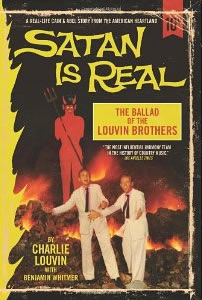Book Notes
 Charlie Louvin with Benjamin Whitmer, Satan is Real: The Ballad of the Louvin Brothers (Igniter Literary Group, 2012); The Louvin Brothers, Satan is Real (Capitol Nashville, originally released 1959)
Charlie Louvin with Benjamin Whitmer, Satan is Real: The Ballad of the Louvin Brothers (Igniter Literary Group, 2012); The Louvin Brothers, Satan is Real (Capitol Nashville, originally released 1959)
A combination book-music review by JwJ music editor Dave Werther.
In his memoir Satan is Real: The Ballad of the Louvin Brothers, Charlie Louvin credits his mother for teaching him and his older brother, Ira, to sing. Among the songs they learned from her was "Mary of the Wild Moor." The ballad tells the story of a woman who leaves her family when she becomes pregnant, but later returns with her child, seeking refuge.
Father, dear Father, she cried
Come down and open the door
Or the child in my arms will perish and die,
From the winds that blow across the wild moor.
The father, "deaf to her cry," lets his daughter die on his doorstep. Charlie reflected on that phrase. "Not deaf, but deaf to her cry. It wasn't that he couldn't hear her, he just wouldn't hear her. He laid up there in his big featherbed and let her freeze to death." (page 32)
Later the Louvin Brothers would write and record their own tale, "Knoxville Girl," which ratcheted up the violence considerably and went on to become one of their most popular songs. In this case a jealous man, noting his girl's "roving eyes," beats her mercilessly and then throws her into the river. Charlie's father could have been a model for such brutality, as he once beat Ira until his son lay unconscious. Arguably, paternal abuse and violence spurred Ira and Charlie on to musical greatness and destroyed one of the greatest singing duos of all time. Like one of their sisters who married at age 14, the Louvin brothers were eager to leave home and the arduous field work their father drove them to. Recognizing their musical ability, they pursued singing as the ticket away from the relentless toil of trying to scratch a living out of the dirt.
Though Charlie and Ira worked hard for years to get a spot on the Opry and earn a steady living from their writing and performing, no one ever doubted their gifts. Their particular magic lay in their amazing ability to trade parts. "It baffled a lot of people, too, how we could change parts without nudging or winking at each other. He'd take the high lead and I'd do the low harmony under it, and he knew exactly when my part would get too high for me just like I knew when his would get to low for him, and we could change in the middle of a word." (page 41)
Off stage the brothers never changed parts. Ira was a perfectionist who could not stand criticism and sought solace in the bottle. It's not for nothing that the Louvin Brothers' classic recording, Satan is Real, includes the Carter Family's "The Kneeling Drunkard's Prayer," nor that the song's lyrics can be found in Charlie's memoir. Charlie stayed sober. Ira married four times and was nearly done in by his third wife who shot him six times. Charlie and Betty's harmonious marriage ended after 61 years when Charlie died January 26, 2011.
Charlie linked Ira's drinking to their father's beatings of Ira and apparent favoritism. "Maybe Ira thought that Papa beat him so much because he knew he was just plain bad… Or maybe it was just that Ira understood how unfair it was that he was the main target of Papa's beatings, so he spent the rest of his life trying to spit in Papa's eye. He knew what Papa thought of alcohol…" (page 231) Ira's drinking and violence (he had a penchant for smashing his mandolin when it went out of tune) led to the demise of the Louvin Brothers, and so perhaps the father who inadvertently launched their career sowed the seeds that would end it.
Their reputation soured and Charlie, tired of his brother's drunkenness, sought a solo career, going on to become a very successful artist in his own right. Thankfully, the duo lasted long enough to record their classic, "Satan is Real." The record is famous for its fire and brimstone cover as well as its songs. Credit for the cover goes to the brothers. Charlie removed his son's Lionel train set from a sheet of plywood they used to make the sixteen foot image of Satan. The brothers collected old tires and took them to a nearby rock quarry. When it came time for the shoot, they doused the tires with kerosene and got more of a conflagration than they had bargained for; rocks began exploding.
Of the twelve songs on Satan is Real, six are Louvin Brother compositions, including "The Christian Life," a song Roger McGuinn and company featured on the Byrd's first country recording, Sweetheart of the Rodeo, and the title track. The song features a recitation in which Ira reminds the listeners that they can't pick and choose their bits of theology; if God is real, so is Satan. If God is real and every good gift is from Him, then the beautiful blending of the brothers' voices testifies to that reality.
Peter Kreeft once argued for God's existence as follows:
In our culture in which there is a strong interest in Americana and traditional music, one could make a persuasive argument substituting, "There is the singing of the Louvin Brothers" for the argument's premise.There is the music of Johann Sebastian Bach.
Therefore there must be a God.


